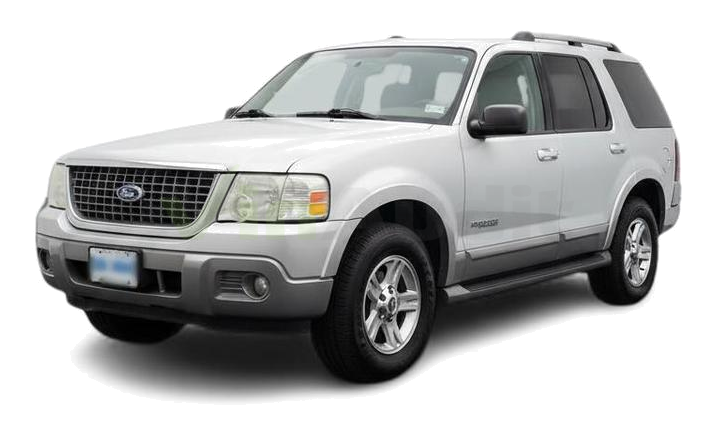The Good
The 2001 Ford Explorer Sport boasts a capable V6 engine and available 4WD, appealing to practical buyers seeking utility, light towing, and off-road prowess. Its distinct 2-door, sporty design offers emotional appeal with a classic, rugged aesthetic. While not the most efficient, its affordable used market value provides excellent utility for budget-conscious owners, balancing adventurous spirit with everyday versatility.
The Bad
Key weaknesses of the 2001 Ford Explorer Sport include frequent automatic transmission issues, particularly the 5R55E. Owners also report common HVAC blend door failures, leading to temperature control problems. Suspension components like lower ball joints are prone to wear, and rust can be a significant concern, especially on the frame and body panels. Fuel economy is also a notable drawback.
2001 Ford Explorer Sport: Quick Overview
- Engine Options: The 2001 Ford Explorer Sport was primarily equipped with one engine: a 4.0-liter SOHC (Single Overhead Cam) V6. This robust engine was a key part of its appeal, offering a good balance of power and capability for its size.
- Horsepower: The 4.0L SOHC V6 engine produced 205 horsepower and 240 lb-ft of torque, providing ample power for daily driving and light-duty tasks.
- Fuel Economy: Fuel efficiency was typical for an SUV of its era. Estimates hovered around 15-16 MPG in the city and 20-21 MPG on the highway for the 2WD model. 4WD versions typically saw a slight decrease in these figures.
- 0-60 Times: The 0-60 mph acceleration time for the 2001 Explorer Sport with the 4.0L V6 was estimated to be in the range of 8.5 to 9.5 seconds, which was respectable for a compact SUV at the time.
- Towing Capacity: When properly equipped, the 2001 Ford Explorer Sport boasted a significant towing capacity, able to handle up to 5,800 pounds. This made it a versatile option for recreational use or light utility hauling.
- Trim-Level Features: The "Sport" itself was the primary trim for the 2-door model, often coming well-equipped. Standard features included power windows, power door locks, power mirrors, air conditioning, and an AM/FM stereo with a cassette player. Optional features could elevate comfort and convenience, such as:
- Cruise control
- Remote keyless entry
- CD player (sometimes with a 6-disc changer)
- Premium audio systems
- Leather seating surfaces
- Power driver's seat
- Sunroof
- Fog lights
- 16-inch or 17-inch alloy wheels
- Shift-on-the-fly Control-Trac 4WD system
- Skid plates for off-road protection
- Cargo management systems
2001 Ford Explorer Sport Specifications
Vehicle Information
| Year | 2001 |
| Make | Ford |
| Model | Explorer Sport |
| Trim | - |
| Style | SUV |
| Type | Sport Utility Vehicle |
| Category | Standard Sport Utility Vehicle |
Manufacturing Details
| Made In | United States |
| Manufacturing City | LOUISVILLE |
Dimensions
| Doors | 2-Door |
| Curb Weight | 4005 pounds |
| Gross Vehicle Weight Rating | 5340 pounds |
| Overall Height | 68.20 inches |
| Overall Length | 180.40 inches |
| Overall Width | 70.20 inches |
| Wheelbase Length | 101.80 inches |
| Standard Seating | 4 |
Engine & Performance
| Engine | 4L V6 |
| Engine Size | 4L |
| Engine Cylinders | 6 |
| Transmission | 5-Speed Automatic |
| Transmission Type | Automatic |
| Transmission Speeds | 5-Speed |
| Drivetrain | Four-Wheel Drive |
Additional Features
| Anti-Brake System | 4-Wheel ABS |
| Steering Type | Rack & Pinion |
Pricing
| Manufacturer Suggested Retail Price (MSRP) | $24,055 |
| Invoice Price | $22,010 |
| Delivery Charges | $600 |
Vehicle History Report
Specifications
History
Events
History Check
Check
Check
Check
Check
Listings
Recalls
Check
Analysis
What Problems Does the 2001 Ford Explorer Sport Have?
Another pervasive issue is the HVAC blend door actuator failure. This typically results in a loss of temperature control, meaning the system can only blow hot or cold air regardless of the setting. While the part itself isn't expensive, accessing it often requires extensive dashboard disassembly, making labor costs high.
Suspension components are also a common weak point. The lower ball joints are known to wear prematurely, leading to clunking noises, poor alignment, and in severe cases, wheel separation – a serious safety hazard. Many older Explorer models, including the 2001 Sport, were subject to recalls related to ball joint issues. Power window regulators and motors can fail, a common complaint across many Ford vehicles of this era.
The 4.0L SOHC V6 engine is generally robust, but some owners report issues with timing chain guides, particularly on higher mileage examples, which can manifest as a rattling noise. Rust is a significant long-term concern, especially in regions with heavy road salt use. Frame rust, body panel rust (around wheel wells and rocker panels), and brake line corrosion are common and can compromise the vehicle's structural integrity and safety.
Regarding recalls, the Explorer line faced numerous campaigns. Critically, many were involved in the Firestone tire controversy, though the 2-door Sport was less associated with the rollover risk than its 4-door sibling. Several recalls addressed the cruise control deactivation switch, which posed a fire risk due to electrical shorts. Owners should verify that all applicable recalls for their specific vehicle have been addressed.
How long will the 2001 Ford Explorer Sport last?
The automatic transmission is a primary long-term concern, often requiring rebuilds or replacement around the 100,000-150,000 mile mark. Suspension components, particularly ball joints and bushings, will inevitably need replacement, impacting ride quality and safety. HVAC blend door actuators almost invariably fail. Rust, especially on the frame and body, becomes a significant issue in older age, particularly in colder climates. While the core engine can last, these peripheral yet critical components require attention and investment for extended service life.
What Technology & Safety Features are Included?
For entertainment, the standard setup was an AM/FM stereo with a cassette player. Optional upgrades included a CD player, often integrated into the head unit, and some models offered a premium sound system for enhanced audio quality. A multi-disc CD changer was also an available option, usually mounted remotely.
Driver-assistance features were quite basic by today's standards. The most significant feature was the available Control-Trac 4WD system, which allowed for shift-on-the-fly engagement between 2WD, 4-High, and 4-Low modes, providing enhanced traction. Anti-lock brakes (ABS) were standard or optional depending on the specific configuration, offering improved stopping control. There were no advanced systems like blind-spot monitoring, lane-keeping assist, or adaptive cruise control, as these technologies were still nascent or not yet implemented in this class.
Safety features included dual front airbags for the driver and front passenger, along with the aforementioned anti-lock braking system. Rear child seat anchors (LATCH system) were present, facilitating secure installation of child safety seats. The Explorer Sport did not offer side airbags or electronic stability control, which later became standard in many vehicles.
In terms of crash-test ratings, the 2001 Ford Explorer Sport generally performed adequately for its time. From the National Highway Traffic Safety Administration (NHTSA):
- Frontal Impact: 4 out of 5 stars for both the driver and passenger sides.
- Side Impact: 5 out of 5 stars for both the driver and rear passenger.
- Rollover: 3 out of 5 stars. This rating was common for SUVs of that period due to their higher center of gravity.
What Colors Options are Available?
2001 Ford Explorer Sport Prices and Market Value
Factors affecting its current resale value include overall mechanical condition (especially the transmission and suspension), presence of rust, mileage, whether it's 4WD, and the completeness of maintenance records. The 2-door body style is less desired than the 4-door, which can also slightly depress its value compared to other classic SUVs.
2001 Ford Explorer Sport Cost of Ownership
2001 Ford Explorer Sport Fuel Efficiency
2001 Ford Explorer Sport Safety Rating
NHTSA
IIHS
2001 Ford Explorer Sport Warranty
Basic
Powertrain
Rust
2001 Ford Explorer Sport Insurance
reasonable repair costs.
How Does the 2001 Ford Explorer Sport Compare to Other Sport Utility Vehicle?
In terms of Performance, the Explorer Sport's 4.0L SOHC V6 offered competitive power (205 hp) and decent towing capacity (up to 5,800 lbs). The Chevrolet Blazer with its 4.3L V6 was a close match, often feeling similar in acceleration and handling. The Nissan Xterra's 3.3L V6 was less powerful (around 170 hp), making it feel slower, while the Toyota 4Runner's 3.4L V6 (183 hp) offered smooth power delivery and excellent reliability, though not as much raw horsepower.
Regarding Features, all these vehicles offered a similar set of basic amenities: power accessories, air conditioning, and available 4WD. The Explorer Sport and Blazer were often seen as more "car-like" in their interiors compared to the more utilitarian Xterra, which emphasized ruggedness over refinement. The 4Runner generally offered a more refined interior and higher build quality.
Reliability is where the Explorer Sport often fell short against some rivals. Its common issues with the 5R55E automatic transmission and suspension components were significant drawbacks. The Chevrolet Blazer also had its share of electrical and engine-related problems. The Nissan Xterra was generally more reliable than the Ford or Chevy, though some minor electrical quirks were reported. The Toyota 4Runner, however, stood out as the class leader in reliability, particularly known for its bulletproof V6 engine and robust drivetrain, requiring less major work over its lifespan.
In terms of Price, when new, they were all competitive. On the used market, the Explorer Sport and Blazer are typically the most affordable due to higher depreciation and known reliability concerns. The Nissan Xterra holds its value better, and the Toyota 4Runner commands the highest used prices by a significant margin, directly reflecting its superior reliability and long-term durability.
Recommended Alternatives:
- Better Alternative (Reliability/Resale): The Toyota 4Runner (3rd Generation) is a superior choice if budget allows, offering exceptional reliability, strong off-road capability, and better resale value.
- Similar Alternative (Budget/Utility): The Chevrolet Blazer (2-door) is a very similar alternative with comparable pros and cons, often found at similar price points.
- Alternative (Ruggedness/Reliability): The Nissan Xterra (1st Generation) provides a rugged, more basic SUV experience with generally better reliability than the Explorer Sport, though with less interior refinement.
Final Verdict: Is the 2001 Ford Explorer Sport a Good Sport Utility Vehicle?
It is advisable to purchase only a well-inspected example where the automatic transmission shifts smoothly without hesitation or harshness, as this is its most significant weak point. Thoroughly check for rust on the frame and body, and ensure suspension components like ball joints are in good condition. Be prepared for potential HVAC blend door repairs. This vehicle is best suited as a secondary vehicle or for someone with mechanical aptitude, rather than a primary daily driver for long commutes without a solid contingency plan. Look for examples with documented maintenance history for the best chance of a reliable ownership experience.

